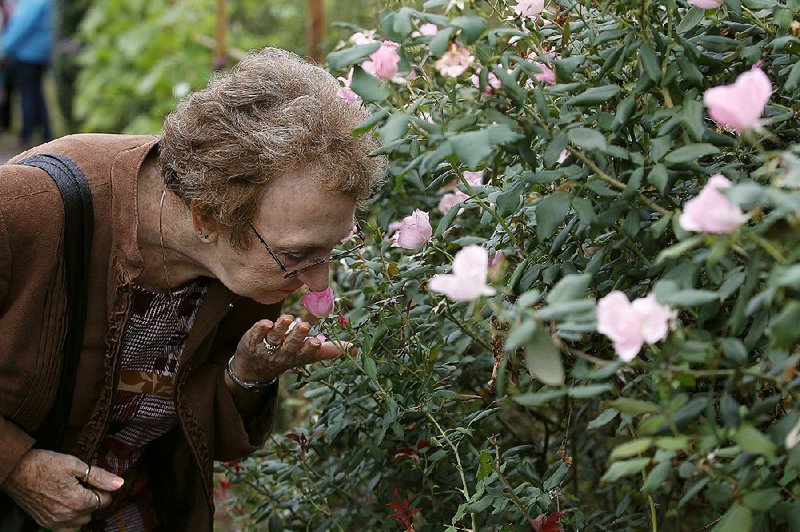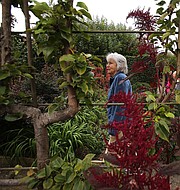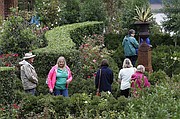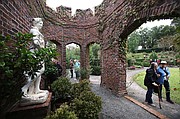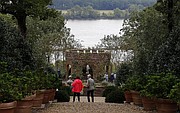More than 1,100 Arkansas Master Gardeners from across the state celebrated 30 years of their thriving horticultural volunteer program by gathering Oct. 13 at Moss Mountain Farm in Roland.
It is hard to believe that this big program of the University of Arkansas Division of Agriculture's Cooperative Extension Service began Oct. 13, 1988, as a mere seed: 40 eager trainees from four counties. Today, Master Gardeners has more than 3,400 members in 67 counties.
Master Gardeners certainly do know how to make things grow.
As horticulturally trained volunteers, Arkansas Master Gardeners first learn about the best research-based gardening practices. Then they extend that solid information across Arkansas through demonstrations and presentations using those best practices. Their handiwork is visible in counties across the state, from community beautification efforts and demonstration gardens in schools and nursing homes, to farmers market projects, educational seminars, annual plant sales and more.
These trained volunteers share their knowledge and spread their passion for gardening.
To celebrate the 30th anniversary, registered Master Gardeners began entering the gates of Moss Mountain Farm in Roland at 8:30 a.m. They spent the day touring the gardens, visiting and questioning horticulturists, having their pictures taken with the farm's owner and multimedia star P. Allen Smith and, of course, eating -- a barbecue lunch from Whole Hog Cafe NLR and a cake from Blue Cake Co.
For this event, county agents and other extension system staff members and their friends were the volunteers who catered to the Master Gardeners. They did everything from checking folks in and passing out portfolios and calendars to shuttling their guests around the farm in golf carts.
An area 4-H club was on hand, selling pumpkins to raise money for a national 4-H trip for its members.
The weather was cool and rain threatened, but the rain held off until right after lunchtime. Then it rained.
Some hardy gardeners continued touring, while others had already seen the gardens and headed home.
HOW THEY BEGIN
Any gardener can become a Master Gardener. The first step is to contact your local county extension office and register.
Master Gardener training is standardized across the state, with 40 hours of horticulture information about trees, shrubs, annuals and perennials, botany, vegetables, fruit production, lawns, insects, diseases and more. Expectations for becoming a Master Gardener include completion of the 40-hour training, passing a final exam (it is open book) and doing 40 hours of volunteer service for your county.
Today there are many training opportunities. Some counties continue to do face-to-face training sessions, but others offer online training in the fall and winter.
Regardless of how each county handles training, the Master Gardener program remains a local county program, with applications taken in that county. Most counties do an interview to ensure potential volunteers know what to expect. Once you are accepted into the program, some fees will apply. Costs vary across the state.
After volunteers become Master Gardeners, they choose how long they want to stay active. The first year, each volunteer must pay back the 40 hours of service by working in sanctioned county projects, which include beautification plantings, helping to answer phones in the county extension office, working in youth projects, helping to write newsletters or conduct seminars, helping with plant sales and many other projects.
Each volunteer must also accrue 20 more education hours during that first year. Educational opportunities are readily accessible. Most counties hold monthly meetings with educational programs. Statewide gardening events abound, including public seminars, garden shows and garden tours.
After year one, for each additional year volunteers want to stay active, they must perform 20 hours of volunteer service and add an additional 20 hours of education.
In 2017, 3,400 volunteers reported 170,301 service hours and 94,767 education hours.
You can see the hard work and beautification efforts of Master Gardener volunteers at county courthouses, county extension office buildings, libraries, fairgrounds and other public buildings. Most county fair horticulture programs and contest judging are handled by local Master Gardeners, and demonstrations, fair booths and other educational sessions are held at county fairs to help recruit new members.
Many counties hold educational seminars or classes for the public throughout the year.
Master Gardeners are the main volunteer force behind the Arkansas Flower & Garden Show in Little Rock, the River Valley Lawn and Garden Show in Fort Smith, and the Pine Bluff Lawn and Garden Show.
COUNTY BY COUNTY
While the program is standardized across the state, each county conducts its programs and projects to meet its own needs.
Most county Master Gardener groups meet monthly, but the day of the week and time vary by county.
County newsletters go out to inform volunteers of educational opportunities and to keep them connected. While communication happens at the county level, it also happens statewide.
Master Gardeners has a statewide network that shares information about events across the state, so members are informed of all the educational opportunities available. A yearly calendar adds more information, and all its illustrations are photos taken in Arkansas by state Master Gardeners. Gardening tips and dates of gardening events are included in the calendar. Copies are available for $1 plus shipping.
Each year, 500-600 Master Gardeners from across the state attend the annual state conference. The location rotates across the state to let people visit other areas and learn more about Arkansas while they're learning more about gardening. At each conference there are keynote speakers, seminars, garden tours, trade shows and special events.
The 2018 conference was in Fort Smith; the 2019 event will be in Hope, and the 2020 conference will be in Jonesboro. Counties help organize and conduct these events, building leadership skills along with gardening skills.
Master Gardeners also work with young people, in schools, 4-H clubs and other organizations. Whether it is going into the classroom to teach a gardening segment or to supervise a year-round, raised-bed planting project, they are trying to teach the next generation about gardening and encourage healthy eating habits.
On the opposite end of the spectrum, there are nursing home projects and plant-therapy sessions in which volunteers work with older people. From beautification efforts, to hands-on planting projects in raised beds, the programs are varied to meet the needs of the clientele.
Many counties also hold annual plant sales, for which volunteers raise plants that grow well in their area to sell to the public.
Some do weekly propagation sessions, where they go to their garden and divide plants, take cuttings and harvest seeds to grow more plants. Some counties are fortunate to have a greenhouse where they can grow even more plants. These local plant sales, held in the spring each year, are a great venue in which anyone can pick up new garden stars as well as older pass-along plants that are often not readily available.
The Arkansas Master Gardener program is like a garden -- ever changing and ever growing. Men and women of all ages and backgrounds come together with one thing in common -- a love of gardening. This connection quickly unites them into a force to be reckoned with -- and the results have been pretty amazing.
Janet B. Carson is a horticulture specialist for the University of Arkansas Cooperative Extension Service.
HomeStyle on 10/20/2018

